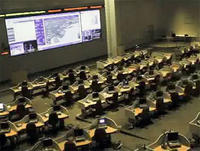-
Washington to test police gun safety equipment
Lawmakers in Washington are currently debating legislation that would require police departments to thoroughly test the gun locks and safes they issue to law enforcement officers for use in their homes
-
-
Report finds Aero aids torture by transporting suspects
A recently released report by the University of North Carolina’s law school has reinvigorated protests against Aero Contractors Ltd. for its alleged role in transporting terrorism suspects to secret foreign prisons where they are interrogated and possibly tortured
-
-
Cameron calls for human rights reforms to aid counterterror efforts

Following the European Court of Human Rights ruling that the United Kingdom could not deport radical Islamic militant Abu Qatada to Jordan, Prime Minister David Cameron blasted the court stating that human rights laws were in danger of becoming “distorted” and “discredited” because of the court’s decisions
-
-
Real ID deadlines looms

More and more states have adapted the driver’s licenses they issue to meet the requirements of the Real ID Act; several states have not – and they have until 15 January 2013 to do so, or receive an extension from DHS; if these states do not change their driver’s license or receive an extension, their residents will need to start getting passports in order to board commercial airlines
-
-
Facial recognition tech helps California police nab two thieves
With the help of facial recognition technology, police in Lancaster, California were able to apprehend two individuals thought to be behind a string of armed robberies
-
-
Inspectors uncover Qaddafi’s hidden WMD stockpile
Last week international weapons inspector found clear evidence that the late Libyan dictator Moammar Qaddafi had large caches of hidden chemical weapons, despite making a promise to destroy all weapons of mass destruction weapons in 2004
-
-
China syndrome: a giant sucking sound
Discussions of cyber warfare typically focus on the threat posed by terrorists or nation-states to U.S. critical infrastructure – power grid, water systems, financial institutions, etc.; three former high-level U.S. security officials argue that the threat of China’s economic cyber espionage looms even more ominously; the former officials say the evidence is irrefutable: China intends to help build its economy by industrial espionage and theft “rather than by innovation and investment in research and development (two strong suits of the U.S. economy)”
-
-
Animal rights activists set fourteen cattle trucks ablaze

Earlier this month fourteen cattle-transportation trailers were set on fire at California’s largest feed yard by an animal rights group; following the attack, the Animal Liberation Front (ALF) released a statement that indicated an anonymous group of activists had executed the attack against the “horrors of factory farming”
-
-
N.J. city augments surveillance cameras with spotlights
Over the next three months, the East Orange police department will connect high-powered spotlights to their surveillance camera system, so that when camera operators spot suspicious activity they can turn on the bright lights of justice and deter would be criminals
-
-
Spike in violent incidents in hospitals

Over the past decade, hospitals across the nation have been subject to an alarming increase in violent incidents; in the last five years alone, there has been nearly a 300 percent increase in the number of reported homicides, assaults, and rapes compared to the previous five years
-
-
DHS: more than 1,600 deportation cases should be closed
As part of the Obama administration’s ongoing efforts to shift its immigration policy to deporting dangerous illegal immigrants, last week DHS officials recommended canceling deportation proceedings against more than 1,600 illegal immigrants in Denver and Baltimore who were not deemed a threat
-
-
Bipartisan panel calls for local emphasis in DHS intelligence

A new report by a bipartisan group of security experts argues that DHS should shift its intelligence gathering efforts away from foreign enemies and focus on local threats by working with law enforcement agencies and the private sector to secure critical infrastructure, the border, and cities from domestic threats
-
-
Police chiefs at White House to discuss domestic radicalization
Law enforcement officials from state and local agencies across the United States gathered on Wednesday at the White House to discuss the delicate balance between safeguarding against domestic extremism and maintaining the trust of the residents they serve
-
-
Torture of USS Cole suspect becomes issue in trial
At a pretrial hearing, before a Guantanamo Bay military commission, the defense lawyer for one of the accused USS Cole bombers, said his client had been so traumatized by years of torture that he could not meet effectively with lawyers while still shackled
-
-
Experts: SOPA, PROTECT IP will stifle creativity, diminish free speech
Legal experts say that Stop Online Piracy Act (SOPA) are to intellectual property what the Communications Decency Act was to “indecent” online material — an incredibly powerful, blunt instrument that would drastically diminish free speech
-
More headlines
The long view
Factories First: Winning the Drone War Before It Starts
Wars are won by factories before they are won on the battlefield,Martin C. Feldmann writes, noting that the United States lacks the manufacturing depth for the coming drone age. Rectifying this situation “will take far more than procurement tweaks,” Feldmann writes. “It demands a national-level, wartime-scale industrial mobilization.”
No Nation Is an Island: The Dangers of Modern U.S. Isolationism
The resurgence of isolationist sentiment in American politics is understandable but misguided. While the desire to refocus on domestic renewal is justified, retreating from the world will not bring the security, prosperity, or sovereignty that its proponents promise. On the contrary, it invites instability, diminishes U.S. influence, and erodes the democratic order the U.S. helped forge.
Fragmented by Design: USAID’s Dismantling and the Future of American Foreign Aid
The Trump administration launched an aggressive restructuring of U.S. foreign aid, effectively dismantling the United States Agency for International Development (USAID). The humanitarian and geopolitical fallout of the demise of USAID includes shuttered clinics, destroyed food aid, and China’s growing influence in the global south. This new era of American soft power will determine how, and whether, the U.S. continues to lead in global development.
Water Wars: A Historic Agreement Between Mexico and US Is Ramping Up Border Tension
As climate change drives rising temperatures and changes in rainfall, Mexico and the US are in the middle of a conflict over water, putting an additional strain on their relationship. Partly due to constant droughts, Mexico has struggled to maintain its water deliveries for much of the last 25 years, deliveries to which it is obligated by a 1944 water-sharing agreement between the two countries.
How Disastrous Was the Trump-Putin Meeting?
In Alaska, Trump got played by Putin. Therefore, Steven Pifer writes, the European leaders and Zelensky have to “diplomatically offer suggestions to walk Trump back from a position that he does not appear to understand would be bad for Ukraine, bad for Europe, and bad for American interests. And they have to do so without setting off an explosion that could disrupt U.S.-Ukrainian and U.S.-European relations—all to the delight of Putin and the Kremlin.”
How Male Grievance Fuels Radicalization and Extremist Violence
Social extremism is evolving in reach and form. While traditional racial supremacy ideologies remain, contemporary movements are now often fueled by something more personal and emotionally resonant: male grievance.
